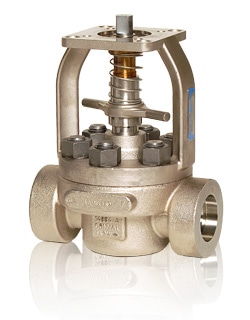Top Entry Ball Valve WEB CATALOG Catalog

Conval Camseal® Ball Valves are designed for the world’s most demanding high-pressure, high-temperature applications.
- Metal Seat
- Zero Leakage
- Top Entry
- ISO – 5211 Integral Mounting Pad
- Industry’s Lowest Life Cycle Costs
- Low Emissions Ball Valve Design
- Wide Variety of End Connections

Standard Sizes
Ball Valve Sizes through 4″
Pressure Rating
ASME Class through 4500#
Standard Forging ASME Materials
SA 105, SA 182-F22, SA 182-F91, SA 182-F92, SA 182-F316 Other materials available upon request
Standard Casting ASME Materials
SA-216 Gr. WCB, SA-217 Gr. WC9, SA-217 Gr. C12A, SA-351 Gr. CF8M
Other materials available upon request
Connections
SW, BW and FNPT Ends
Accessories
Actuators – Electric, Pneumatic or Hydraulic Limitswitch – Single or double Locking Devices – open, closed, or both Position Indicator Stem Shroud
Design Features
Camseal® Ball Valve Provides Zero Leakage
- Zero Body Leakage:
The body/bonnet joint is not subject to pipeline stresses. There is no in-line body bolting to loosen and fatigue, so the body remains leak-free. - Zero Seat Leakage:
All Conval ball valves are capable of meeting zero bubbles for four minutes at 50 psi and 1,000 psi Nitrogen at final factory seat test; after field in-line welding; following post-weld heat treat; during and after process thermal excursions. Modular internals isolate critical seal surfaces from thermal effects. - Zero Stem Seal Leakage:
Conval’s exclusive Integral Gland Wrench concentrically loads the stem packing without tools, eliminating stem leaks and extending packing life. Live loading is available as an option. - Robust Stem-Ball Engagement:
Reliable, accurate ball alignment is achieved due to the robust engagement between the one-piece stem and the ball.
Superior Bearing Support
Superior bearing support of the blowout-proof stem ensures proper axial alignment and Zero Seat Leakage even on actuated valves. We are unique in that a bearing supports the stem above and below the packing. This greatly extends the life of the packing.
Proprietary Chrome Carbide Coating System
Conval’s highly-engineered Chrome Carbide coating system has superior bond strength and coating density to provide long-life and leak-free performance even in high temperature-drop applications.
Integral Mounting Pad
An ISO-5211 integral mounting pad facilitates error-free, air, motor and gear operator actuation due to superior rigidity, precise alignment and a fully-guided stem bearing system. Lockout capability is standard.
Single-piece Gland
In extreme environments, the simpler the design and the fewer the parts, the better. The durable single-piece stainless steel gland contributes to the longevity of the valve.
Axial-Loaded Packing System
The Axial design ensures tight concentricity, which eliminates side loading of the packing and minimizes wear forces on the trim components. This feature is critical for superior ball valve performance.
Rapid In-Line Renewability
The CAMSEAL® Ball Valve is much easier to renew than anything else on the market. The CAMSEAL® Ball Valve line provides a modular solution to rising maintenance expenses. Low acquisition cost is not as important as low cost over the serviceable life of a valve. Maintaining a Conval valve is far easier and much less costly than replacing a competitor’s valve.
Camseal® Ball Valve Design and Testing
Sophisticated state of the art techniques are used for applying hard coatings, grinding and lapping the ball and seat of the Camseal®. The extremely high density of the coating and the precise lapping techniques produce a ball-to-seat seal that is bubble tight, and will remain bubble tight during and after installation.
The Camseal® seat and the ends of the valve are separate components. In practice, this isolates the seat from the end of the valve during installation. Unlike valves in which the seat is an integral part of the valve end, this configuration isolates the seat from damaging heat of welding. This results in a ball valve that remains bubble-tight after it is welded in line and subsequently post weld heat treated.
The Camseal® ball valve has been subjected to rigorous computer-aided analysis, laboratory testing and field testing during its development. State of the art 3-D computer modeling was used to optimize the design details of the valve. Extensive laboratory testing was conducted to verify these results. Prototypes were subjected to severe thermal testing with repeated thermal cycles between ambient and 1200 degrees F. Pressure testing was done with repeated pressure cycles between atmospheric pressure and varying pressures; tests were performed with both gas and liquid. Steam blow-down testing was performed with a 2,000 psi pressure drop. Various mechanical tests were run. The valve has consistently passed a very rigorous program of tests.
Top Entry Ball Valve Usage
Top entry ball valves are used in piping systems where the top of the valve can be removed to gain access to the ball and seats without removing the entire valve from the piping system. Typically made from a metal casting process, top entry ball valves require specific testing to make sure there are no defects. The body of Conval’s Camseal® top-entry ball valves are made from forgings ensuring maximum performance without the porosity, expensive inspection and time consuming improvement problems involved with castings. This strength makes them applicable for a variety of industries.
Top entry ball valves are typically used in process systems where in-line maintenance is preferred over full valve removal. As such, it is common for top entry ball valves to be used in high-pressure applications that require infrequent maintenance, like high integrity pressure protection system (HIPPS) valves.
Conval’s Camseal® top entry ball valves have the following advantages:
In-Line Repairable
At Conval, every valve we create is designed for in-line maintenance and repair, which minimizes operational downtime. Other valve types—such as end entry or welded body ball valves—require the valve to be fully removed from the piping system before repairs or maintenance can be conducted.
This often involves cutting equipment to get the valve out and welding equipment to put it back in. With valves from Conval, there are also no special tools needed to make the repairs.
Metal Seating
Metal seating protects the deterioration of the valve’s sealing elements in harsh operating conditions, such as high-temperature, abrasive, dirty, or corrosive environments. Metal seated valves can tolerate a broad variety of harsh conditions and can be coated to improve various physical resistances. Metal seats can be configured in three ways:
- Type A. This configuration uses a standard metal seat in conjunction with polymeric body seals, stem packing, and body seals. The Type A configuration works best in applications facing significant operational wear from abrasive environmental elements, but is not suitable for high temperature operation.
- Type B. The Type B metal seat relies on a downstream metal seat in conjunction with graphite seals and stem packing to improve the acceptable operational temperature range.
- Type C. This configuration uses both an upstream and downstream metal seat. The upstream seat will be spring-loaded against the flow to help the downstream. Type C configurations can tolerate a variety of high temperature process flows.
Severe Service Compatibility
Ball valves sometimes require additional protection to operate effectively in harsh conditions, such as high-temperature or high-pressure environments. In these cases, the valves must be made from sturdy materials and often require metallic or ceramic coatings to protect the units from surface-related wear problems and other accelerated destruction. Suitable stem materials are also required to keep the valve functioning properly in harsh conditions.
Common materials for coatings include:
- Electroless nickel plating provides strong wear resistance and good resistance to acidic and corrosive environments, such as oil drilling or coal mining.
- Plasma nitride features high wear resistance and anti-galling properties. It can be applied to just about any metal.
- Stellite 12 and stellite 6 alloys are resistant to many types of mechanical and chemical degradation and retains their hardness up to 500° C.
- Hard nickel alloy is highly resistant to abrasion, particle erosion, and fretting. It has excellent corrosion resistance and high strength at elevated temperatures.
- Tungsten carbide is ideal for severe wear protection from abrasion, corrosion, erosion, or any combination of the three.
Camseal® Top Entry Ball Valves from Conval
Conval was established in 1967 and has since grown into the world’s premier manufacturer of high-quality, high-pressure forged steel valves. Our global team of experts provides valves for the most demanding applications in the world. We continue to develop new products that address the evolving needs and trends in the valve industry.
Please contact us or request a quote for more information about our top entry ball valves or other process solutions.




